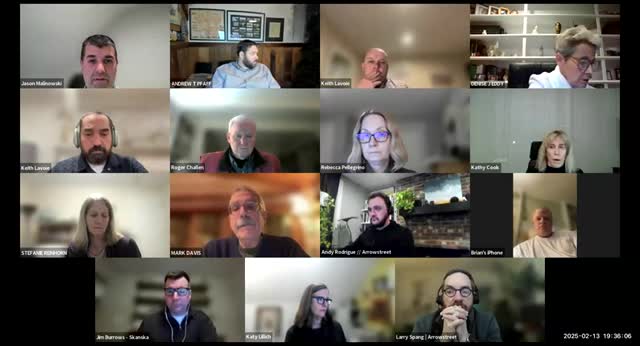Neary committee approves $108.5 million schematic-design budget after value‑engineering debate
Get AI-powered insights, summaries, and transcripts
Subscribe
Summary
The Neary Building Committee voted 6‑0 to submit a $108,517,025 total project budget to the Massachusetts School Building Authority after narrowing a list of value‑engineering options and debating soil contingencies, HVAC incentives and playground funding.
The Neary Building Committee voted 6‑0 Thursday to submit a total project budget of $108,517,025 to the Massachusetts School Building Authority (MSBA) for the Margaret A. Neary Elementary School schematic‑design package.
Committee members spent most of the meeting reviewing a value‑engineering spreadsheet of building, site and mechanical options intended to reduce the town’s bonded share. The group narrowed dozens of line items — keeping most educational elements intact — and agreed to carry a package of changes that committee staff say reduces the town’s effective share toward the committee’s target (slightly below $70 million in the town’s internal accounting).
Why it matters: the schematic‑design budget and the list of identified alternates determine what the town will present at the May 10 town meeting and what the MSBA will use to calculate reimbursement eligibility. The committee’s decisions change the project’s estimated permanent bond and the projected annual tax impact for an average Southborough homeowner.
What the committee approved and kept: the group adopted several lower‑cost exterior and interior changes offered by the design and construction teams while preserving many programmatic elements requested by the schools. Among the items discussed and carried forward were a 50% reduction in acoustical roof screens (estimated savings $360,000) and a change in a metal exterior panel to a lower‑cost corrugated/aluminum option that the design team said maintains the intended visual concept. The committee also agreed to move gym bleachers into the FF&E (furnishings, fixtures & equipment) budget (estimated $70,200 savings) rather than eliminate them from the project scope.
School staff successfully asked the committee to retain classroom flexibility features. Stephanie (school administration) told the committee that movable partitions and some shared classroom doors provide “flexibility for professional learning sessions or for project‑based learning and flexible grouping across classrooms,” and the committee elected to keep those items in the base design.
Soils and contingency debate: a central point of discussion was how much of the soils allowance to carry in the construction line versus in contingency. The design/construction team presented three soils options (current allowance reductions to $750k, $500k or $250k). Committee members split between a lower allowance and preserving contingency; after running numbers the group agreed to a compromise that effectively increased contingency and reflected a prudent balance between reducing the town share and retaining protection against unknown subsurface work. Finance and construction staff ran the updated totals live and reported the town share and the draft permanent bond under the chosen option before the vote.
Energy incentives and HVAC: the committee reviewed numbers that show deleting geothermal wells and replacing them with alternatives would reduce the construction cost by multiple millions of dollars (presented figures: roughly $4.08M savings to switch to VRF/no geothermal, or about $2.67M to switch to air‑source heat pumps). Committee members and staff also discussed projected federal and state energy incentives (Mass Save and Inflation Reduction Act credits). The design team cautioned that some federal credits require documentation and compliance (labor tracking, prevailing‑wage documentation) and that rebates are realized only after systems are built and operating; the committee included a conservative estimate of the incentives in its final internal calculation used for outreach but noted there is some timing and documentation risk.
Playground and alternates: the landscape team’s order‑of‑magnitude estimate for a new playground (presented as roughly $1.05M) prompted discussion about whether to carry the playground in the base contract or treat it as an alternate/separately bid item. The committee agreed not to remove plans for a playground but to pursue alternative funding and procurement approaches — including a separate bid or a capital‑article strategy — so the town can deliver a completed, durable playground without adding the full equipment cost into the base GMP that carries higher contractor markups.
Votes at a glance: • Approve minutes from the prior meeting — motion to approve minutes as presented; roll‑call recorded unanimous approval (6‑0). (motion moved by Chair; second recorded; roll call: Andrew — yes; Denise — yes; Roger — yes; Kathy Epstein — yes; Mark — yes; Chair — yes) • Approve schematic‑design total project budget for submission to MSBA — motion (text read by Chair) to submit a total project budget of $108,517,025; seconded; roll‑call vote 6‑0 to approve. (roll call: Roger — yes; Andrew — yes; Kathy — yes; Denise — yes; Mark — yes; Chair — yes)
What’s next: the committee scheduled a short follow‑up meeting next Thursday morning to review the final narrative updates and any small edits to drawings and the budget package before the MSBA submission. Committee leaders also asked members to send markup comments in writing so the consultants can incorporate them prior to the abbreviated reconvening.
Committee members and staff described the vote as a step toward a May town meeting presentation rather than final construction authorization; several members reiterated that future value‑engineering and verification steps remain during detailed design and prior to the guaranteed maximum price (GMP).
